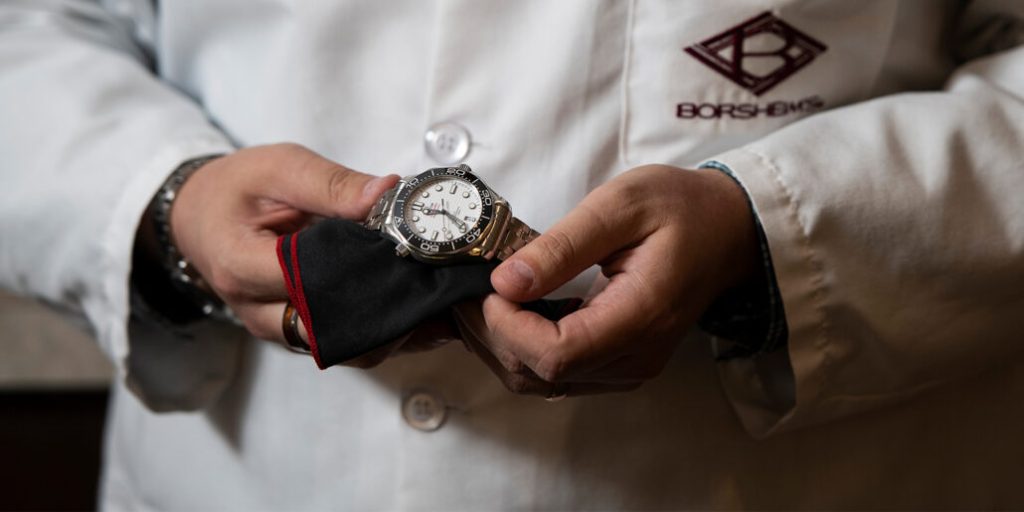blog
How to Care for Your Watch: Maintenance Tips That Last
A luxury watch is more than just an accessory—it’s an investment, a piece of craftsmanship, and often a symbol of personal style. Whether you own a classic mechanical timepiece, a sophisticated quartz watch, or a state-of-the-art smartwatch, taking proper care of your watch is essential to ensuring its longevity and functionality. Regular maintenance not only helps to keep your watch looking pristine but also ensures that it continues to function accurately for years to come.
In this article, we’ll explore a comprehensive guide to watch care, offering essential maintenance tips that will help you protect your timepiece and preserve its value. Whether you are a seasoned watch collector or a first-time owner, these tips will assist you in maintaining your watch in top condition, ensuring that it can be passed down as a legacy or continue to serve you day after day.
1. Regular Cleaning for a Sparkling Shine
One of the most important aspects of maintaining a watch is keeping it clean. Dust, dirt, and oils from your skin can accumulate on the watch’s surface, potentially damaging the finish over time. Regular cleaning is vital to keeping your watch looking its best.
To clean your watch, start by wiping it gently with a soft microfiber cloth to remove any fingerprints or smudges. If your watch is water-resistant, you can use a small brush and warm water with a mild soap solution to clean the case and strap. Be cautious with leather bands, as excessive moisture can damage the material. For stainless steel bracelets, a toothbrush with soft bristles can help reach small crevices between links.
Avoid using harsh chemicals or abrasives, as these can scratch the surface or damage the watch’s protective coating. Regularly cleaning your watch will not only help it maintain its shine but also prevent dirt buildup that can impact its functionality.
2. Avoid Extreme Temperature Changes
Extreme temperatures, whether hot or cold, can negatively affect your watch’s performance and longevity. Watches, particularly mechanical ones, rely on precise movements and delicate parts, all of which can be affected by temperature fluctuations.
For instance, high heat can cause the lubricants inside a mechanical movement to evaporate or become less effective, leading to increased friction and potential damage. Cold temperatures, on the other hand, can cause the movement to slow down, affecting the accuracy of the timekeeping.
When wearing or storing your watch, try to avoid exposing it to temperatures above 140°F (60°C) or below freezing, as this can cause irreversible damage to both the internal mechanism and the materials of the watch case. If you need to leave your watch in extreme conditions, consider taking it off and storing it in a safe, temperature-controlled environment.
3. Wind Mechanical Watches Regularly
Mechanical watches are powered by a spring mechanism, which requires winding to maintain the correct time. If you have an automatic (self-winding) watch, it’s powered by the motion of your wrist as you wear it. However, if you leave your watch unworn for a while, it may stop running and need manual winding.
To wind a mechanical watch, pull the crown (the small knob on the side of the case) out to its first position and gently wind it clockwise. Be sure not to overwind the watch, as this can damage the movement. Once you feel resistance, stop winding. For automatic watches, simply wearing them regularly will keep the movement running, but it’s good practice to wind them by hand every few days to ensure they keep running smoothly.
Winding your watch regularly will help maintain the accuracy of the timekeeping and ensure the movement stays lubricated, preventing any issues with the internal components.
4. Store Your Watch Properly
When you’re not wearing your watch, it’s important to store it in a safe, dry place. Proper storage helps prevent damage, especially to the movement and the watch’s case. Avoid leaving your watch in places where it might be exposed to extreme heat, humidity, or magnetic fields, as these can interfere with the movement and cause it to lose accuracy.
A watch box or case with soft cushioning is an ideal storage solution, as it protects your watch from scratches and impacts. If you have a collection of watches, consider investing in a watch winder—a device that gently rotates automatic watches to keep the movement running when not being worn.
For watches with leather straps, storing them in a dry place is especially important. Leather is sensitive to moisture, and exposure to high humidity or sweat can cause the material to deteriorate or warp. To maintain the integrity of the strap, keep your watch away from excessive moisture and avoid wearing it in conditions where it may get excessively wet.
5. Protect Your Watch from Water Damage
Many luxury watches, especially sports models, are designed to be water-resistant. However, water resistance does not mean your watch is invulnerable to water damage. Over time, the seals that prevent water from entering the case may degrade, especially with regular use or exposure to extreme conditions like saltwater or chlorine.
To avoid water damage, ensure that the crown is fully screwed down when wearing your watch in or near water. If your watch is rated for water resistance, check its rating (measured in meters) to ensure it’s suitable for activities like swimming or diving. If you’re unsure of the watch’s water resistance capabilities, it’s best to avoid wearing it in water.
It’s also a good idea to have your watch’s seals checked regularly, particularly if it’s a vintage or high-value timepiece. Water-resistant watches should be serviced every 2-3 years to ensure their seals remain intact.

6. Avoid Shocks and Magnetic Fields
Watches, especially mechanical ones, are sensitive to shocks. Sudden impacts, such as dropping your watch or banging it against a hard surface, can cause internal damage to the movement or the case. Always be mindful of where you place your watch and avoid wearing it when engaging in activities that may expose it to shock, such as sports or manual labor.
Similarly, magnetic fields can disrupt the movement of your watch, particularly if it has a mechanical movement. Watches can be magnetized by exposure to devices such as smartphones, speakers, and electronic equipment. A magnetized watch can cause the time to run fast or slow, or it may stop entirely.
To prevent this, keep your watch away from strong magnetic fields. If you suspect that your watch has been magnetized, many watch repair shops offer demagnetization services to restore the accuracy of the timekeeping.
7. Servicing Your Watch Regularly
Just like any precision instrument, your watch requires regular maintenance to ensure it continues to function properly. Mechanical watches, in particular, require periodic servicing, as the lubricants inside the movement can dry out over time, causing friction and wear on the internal components.
It is generally recommended to have a mechanical watch serviced every 3 to 5 years, depending on the brand and model. The service typically includes cleaning the movement, replacing worn-out parts, and reapplying lubricants to ensure smooth operation. For quartz watches, servicing may be less frequent, but the battery should be replaced regularly to prevent leaks that could damage the movement.
When servicing your watch, always seek out a professional watchmaker or an authorized service center. These specialists have the expertise and tools necessary to maintain the integrity of your watch and ensure that it continues to function at its best.
Conclusion
Taking proper care of your watch is essential to maintaining its performance and appearance over time. By cleaning it regularly, avoiding extreme temperature changes, winding mechanical watches, storing it properly, and protecting it from water and shock damage, you can ensure that your timepiece stays in top condition for years to come. Regular servicing is also key to maintaining the precision and functionality of your watch. With these tips in mind, your watch will continue to be a reliable, timeless companion for years to come.


